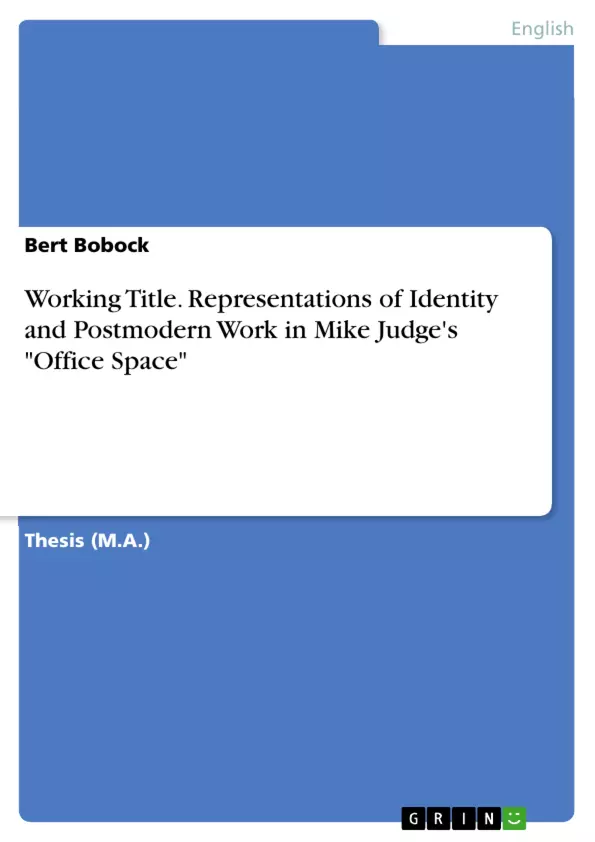"Office Space" recently gained cult status for its parody of the realities of postmodern work combined with a fundamental critique of late twentieth century forms of corporate management. Although it was filmed in 1999, and work conditions have since changed, paid occupational labor is more relevant for individual identity projects than ever. Office Space effectively presents the pressure created by contemporary forms of management and reveals the challenges companies and employees face in defining and finding a purpose for what exactly it is that “they do there”.
The ability to narrate one's own life proves to be of great significance in an age of growing automation and heightened fears of unemployment, particularly regarding the concepts of (work-) time and space. Mike Judge’s satire depicts the shortcomings of a system subject to multiple radical changes such as individualization and the flexibilization of labor. These changes have a direct effect on the postmodern individual: They cause disorientation and drift, social disembedding, and altering human relationships in general.
Inhaltsverzeichnis (Table of Contents)
- 1 Introduction
- 2 Theoretical Framework
- 2.1 Postmodern Insecurity and Identity-Work
- 2.2 Flexibilization and Bureaucracy
- 2.3 Drift and the Social Triangle
- 2.4 Individualization and Social Disembedding
- 3 “Commute from Hell” or “A Case of the Mondays”
- 4 People at Work - “What Do You Think You Do Here?”
- 4.1 Peter's Daily Odyssey
- 4.2 “Call me Mike”: Michael and Samir
- 4.3 The Ratio of People to Cake - Milton Waddams
- 4.4 Planning To Plan: Consulting the Inefficiency Experts
- 4.5 Male Spaces - The Women in Office Space
- 5 Office Inventory
- 5.1 The Trouble with the Stapler
- 5.2 Paper-jammed Printers and Fax Machines
- 6 Deconstructing Spaces
- 6.1 The Cubicle
- 6.2 Fighting Fire with Fire - The Office Building
- 7 Peter, the Postmodern Working Man?
Zielsetzung und Themenschwerpunkte (Objectives and Key Themes)
This thesis analyzes the film Office Space by Mike Judge as a case study for the complexities of postmodern work and identity formation. The film’s satirical portrayal of office life, specifically within a corporate setting, is examined through the lens of sociological theories on postmodernism, individualization, and the flexibilization of labor.
- The impact of postmodern insecurity on identity construction
- The influence of individualization and flexibilization on the workplace
- The challenges of navigating a bureaucratic and increasingly unstable work environment
- The search for meaning and purpose in a world where work has become increasingly detached from individual identity
- The role of social relationships and alternative narratives in providing stability for individuals in a “disembedded” society
Zusammenfassung der Kapitel (Chapter Summaries)
- Introduction: The introduction sets the stage by outlining the context of the film Office Space and its relevance to contemporary discussions on work, identity, and postmodernity. It highlights the film’s satirical approach to corporate culture and its examination of the challenges faced by both employers and employees in defining their roles and purposes in the workplace.
- Theoretical Framework: This chapter provides a foundation for the thesis by introducing key sociological concepts that inform the analysis of the film. It explores the ideas of postmodernism, individualization, and flexibilization of labor markets, and how these concepts contribute to the insecurities and challenges faced by individuals in the postmodern world.
- “Commute from Hell” or “A Case of the Mondays”: This chapter analyzes the daily commute of the main characters as a metaphor for the struggles of navigating a fragmented and individualistic society. It examines the challenges of finding meaning and purpose in the face of a seemingly chaotic and overwhelming environment.
- People at Work - “What Do You Think You Do Here?”: This chapter focuses on the individual characters and their respective approaches to navigating the complexities of office life. It explores their strategies for coping with a work environment that often feels alienating and dehumanizing.
- Office Inventory: This chapter examines the tangible aspects of the workplace – such as the stapler and office equipment – as symbolic representations of the constraints and anxieties associated with postmodern work. It explores how these objects can be seen as tools for control, resistance, and the search for individual autonomy.
- Deconstructing Spaces: This chapter explores the physical spaces of the office, such as the cubicle and the office building, as metaphors for the fragmentation and alienation of postmodern life. It examines how these spaces contribute to the construction of individual identities and the dynamics of power and control within the workplace.
Schlüsselwörter (Keywords)
This thesis delves into the critical themes of postmodern work, identity formation, and the complexities of individualization in a globalized and technologically advanced society. It explores the impact of bureaucratic structures, the flexibilization of labor, and the search for meaning in a rapidly changing world. Key concepts include postmodern insecurity, identity-work, social disembedding, and the role of social networks in providing stability for individuals in a world marked by uncertainty and change.
Frequently Asked Questions
How does the film "Office Space" represent postmodern work?
The film parodies corporate management, the flexibilization of labor, and the disorientation caused by bureaucratic systems in late 20th-century workplaces.
What is "social disembedding" in the context of the office?
It refers to the loss of traditional social ties and the resulting drift and disorientation individuals face in modern, automated work environments.
What do the office cubicles symbolize in the thesis?
Cubicles are analyzed as metaphors for fragmentation, alienation, and the dynamics of power and control within the postmodern workplace.
Why is the red stapler significant?
The stapler represents the search for individual autonomy and resistance against dehumanizing corporate structures.
What is "identity-work" in a professional setting?
Identity-work is the process by which individuals attempt to narrate their own lives and find purpose despite the pressures of automation and unemployment fears.
- Quote paper
- Bert Bobock (Author), 2013, Working Title. Representations of Identity and Postmodern Work in Mike Judge's "Office Space", Munich, GRIN Verlag, https://www.grin.com/document/305928



